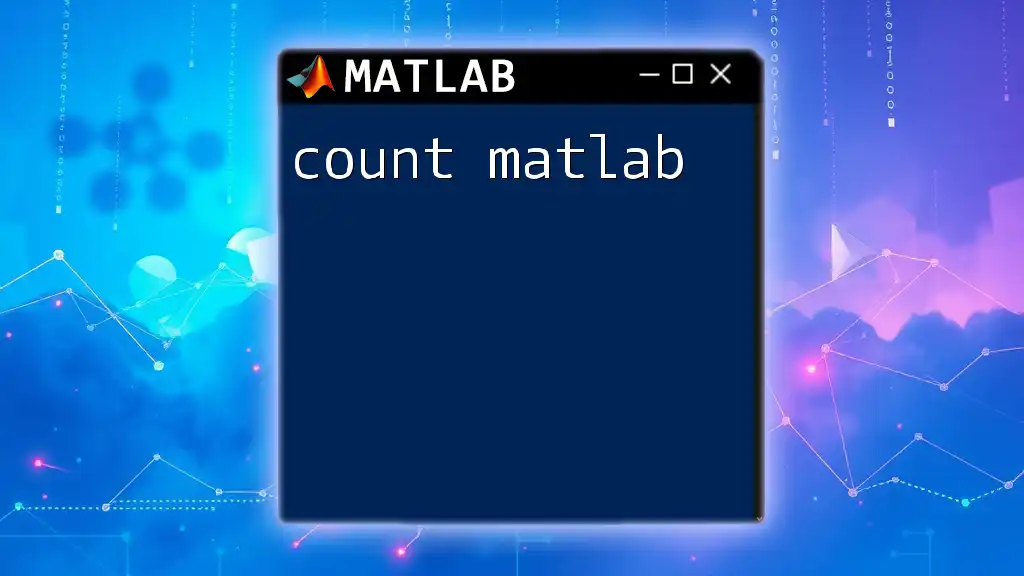"Run time" in MATLAB refers to the period during which a program is executing, allowing for dynamic variable management and function execution; for instance, you can create and manipulate variables as follows:
x = 5; % Define a variable x
y = 10; % Define a variable y
z = x + y; % Calculate the sum at run time
disp(z); % Display the result
What is Run Time?
Run time refers to the period during which a program is executing. It is crucial to differentiate between run time and compile time, the latter being the phase when your MATLAB code is converted into machine code before execution. Understanding the dynamics of run time in MATLAB is vital for optimizing the performance of your scripts and functions.

Importance of Understanding Run Time in MATLAB
Grasping run time concepts can significantly impact your coding practices. Performance becomes particularly critical when working with large datasets or resource-intensive computations. Efficient coding can lead to shorter execution times, which in turn can enhance overall productivity.

Understanding Execution Time
What is Execution Time?
Execution time is specifically the time taken for a program or a part of a program to execute after it has been started. In the context of MATLAB, measuring execution time enables you to identify sections of your code that could benefit from optimization.
Factors Affecting Execution Time in MATLAB
Several factors can influence execution time in MATLAB, including:
- Complexity of operations: More complex mathematical operations typically require more processing power and time.
- Size of data: Larger datasets generally take longer to process, prompting the need for efficient algorithms to handle them effectively.
- Algorithmic efficiency: The choice of algorithms greatly affects run time. Choosing less efficient algorithms can lead to exponentially longer execution times, especially with increasing data sizes.

Measuring Run Time in MATLAB
Using `tic` and `toc` Commands
One of the simplest methods to measure run time in MATLAB is using the `tic` and `toc` commands.
tic;
% Your MATLAB code here
pause(2); % Simulating a delay
elapsed_time = toc;
disp(['Elapsed time: ', num2str(elapsed_time), ' seconds']);
In this example, `tic` starts a stopwatch timer, and `toc` reads the elapsed time since it was started, allowing you to see how long it took to execute your code segment.
Using `timeit` for More Accurate Measurements
For more accurate performance measurements, MATLAB offers the `timeit` function, which is designed to avoid overhead caused by factors like just-in-time compilation.
f = @(x) sum(sin(x)); % Function to measure
time_taken = timeit(@() f(1:1e6));
disp(['Function execution time: ', num2str(time_taken), ' seconds']);
Here, `timeit` runs the given function multiple times and returns the average execution time, providing a more reliable measure of the function's performance.

Analyzing and Optimizing Runtime
Common Performance Bottlenecks
To effectively optimize run time, first identify common performance bottlenecks, such as:
- Inefficient loops: Nested loops can quickly lead to increased execution times.
- Redundant calculations: Performing calculations multiple times within loops can introduce unnecessary delays.
Strategies for Optimization
Vectorization
One of the key strategies for improving performance in MATLAB is vectorization. This method helps you eliminate explicit loops by applying operations across entire arrays or matrices in one go.
For instance, instead of:
% Inefficient loop
for i = 1:length(A)
B(i) = A(i) * 2;
end
You can achieve the same result with a vectorized approach:
% Vectorized version
B = A .* 2;
Vectorization not only simplifies your code but also significantly speeds up execution.
Preallocation of Arrays
Another effective method is to preallocate arrays. MATLAB dynamically resizes arrays during runtime, which can be computationally expensive. By defining the size of an array beforehand, you can boost performance.
Consider the difference:
% Preallocating
B = zeros(1, length(A));
for i = 1:length(A)
B(i) = A(i) * 2;
end
By preallocating `B`, you avoid the costly operations of resizing.

Best Practices for Managing Run Time in MATLAB
Choosing the Right Data Types
Selecting the appropriate data type is paramount. Different MATLAB data types, such as double, single, and int, have varying storage needs and impact overall performance. For large datasets, using `single` instead of `double` can halve memory usage.
Efficient Code Structuring
Code structuring also plays an essential role in performance. Modularizing code into functions not only enhances readability but enables you to isolate performance issues quickly.
Utilizing Built-In Functions
Make the most of MATLAB’s extensive libraries of built-in functions, which are often optimized for performance. These functions can drastically cut down the amount of code you need to write while improving execution speed.

Real-World Applications of Run Time Optimization
Case Study: Processing Large Datasets
Consider a scenario where a company processes large datasets for analytics. Initially, the code allowed redundant calculations and lacked vectorization, leading to an execution time of several minutes. After refactoring the code to include vectorization and preallocation, execution time was reduced to a matter of seconds, dramatically improving productivity.
Simulation Applications
In iterative simulations, even small reductions in execution time can yield significant benefits. Faster run times enable more simulation iterations within the same time frame, enhancing the accuracy and reliability of results.

Conclusion
Understanding and optimizing run time in MATLAB is crucial for enhancing the performance of your code. By employing techniques such as measuring execution time, vectorization, preallocation, and utilizing built-in functions, you can dramatically improve efficiency. We encourage you to experiment with these strategies in your MATLAB projects, fostering a more streamlined workflow and better performance overall.

Additional Resources
For those looking to dive deeper into the intricacies of run time in MATLAB, consulting MATLAB's documentation can provide valuable insights. Consider enrolling in specialized online courses or reading comprehensive books to further your understanding.

Call to Action
Join our newsletter for more quick MATLAB tips and follow us on social media for regular updates! Start optimizing your code today and unlock the true potential of your projects!

















